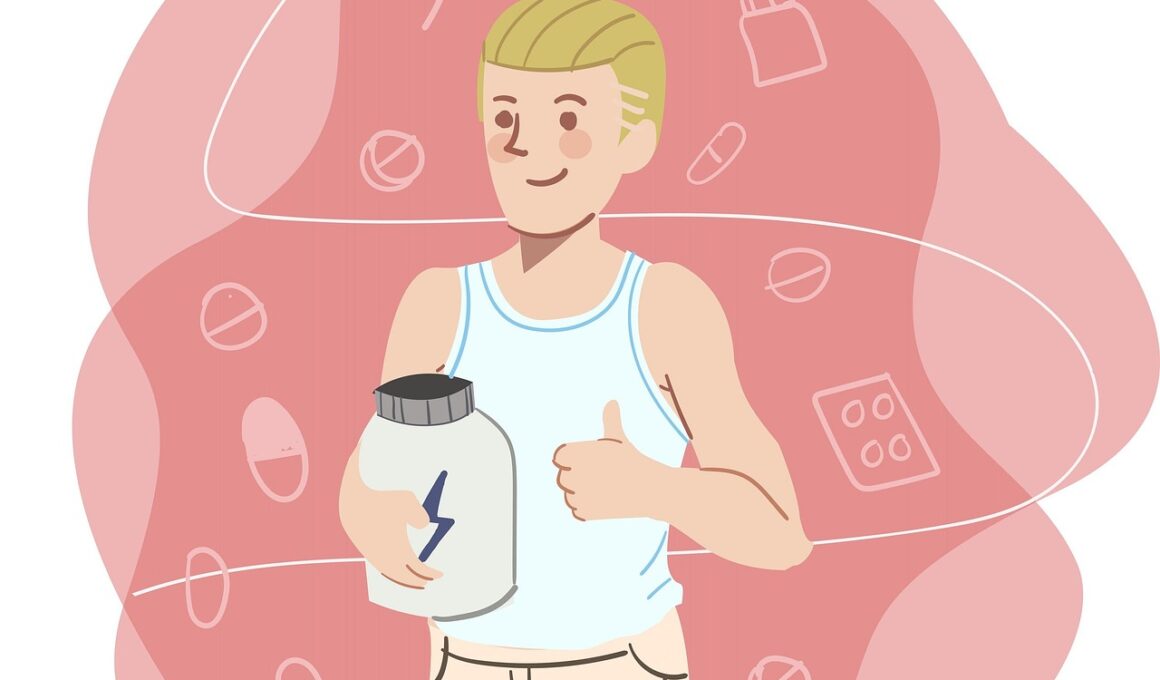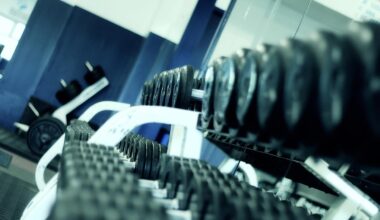Nutrition Tips to Complement Your Pro Athlete Training Plan
For pro athletes, nutrition is as vital as training. Consuming the right nutrients will maximize performance, recovery, and overall health. Start by ensuring adequate hydration. Staying hydrated affects not only your performance but also mental clarity and energy levels. Aim to drink water regularly throughout the day. You can add electrolyte-rich drinks after high-intensity workouts. Incorporate complex carbohydrates into your meals, such as brown rice, quinoa, and whole-grain pastas. These foods provide steady energy for training and competition. Emphasize protein in your diet; lean meats, fish, tofu, and legumes are great sources. Protein repairs muscles after workouts, aiding recovery and growth. Don’t forget healthy fats, like those found in avocados, nuts, and olive oil. They promote brain health and hormone balance. Plan meals around training schedules, ensuring you consume nutrient-dense options. Timing is essential, particularly post-workout when your body craves nutrients. Consider a balance of macronutrients—carbs, proteins, and fats. Each nutrient plays a role in performance and recovery, making a well-rounded diet non-negotiable for serious athletes. Incorporate colorful fruits and vegetables for vital vitamins and antioxidants to minimize oxidative stress.
Another critical aspect of a pro athlete’s nutrition plan is adequate fueling before workouts. Plan meals two to three hours prior to exercising to optimize your energy levels. Focus on easily digestible foods like bananas, oatmeal, or smoothies. These provide essential carbohydrates without weighing you down. Post-workout nutrition is crucial for recovery; consume a combination of protein and carbohydrates immediately after your session. The window period for this is around 30 minutes, making it essential to have snacks on hand. Foods such as Greek yogurt with berries or a protein shake with a banana work wonders. These snacks can replenish glycogen stores and facilitate muscle repair. Additionally, pay attention to your micronutrients—vitamins and minerals play significant roles in energy metabolism and recovery. Utilize nutritional guides or consult a registered dietitian to determine whether you need to supplement. Focus on iron and calcium, crucial for peak performance. Integrate various food sources and colors to ensure you’re covering all nutrient needs. Don’t overlook the role of sleep and recovery; proper rest complements your dietary efforts, helping to enhance overall athletic performance.
Meal Prepping for Success
Meal prepping can significantly simplify healthy eating for athletes. Planning meals for the week reduces food choice fatigue, saving time and ensuring nutrient intake. Start by dedicating a few hours on weekends to prepare meals. Focus on balanced combinations of proteins, carbohydrates, and fats for optimal energy. Create an inventory of your favorite meals; consider options like grilled chicken with sweet potatoes or chickpea salads loaded with veggies. Invest in containers to portion out meals conveniently for on-the-go consumption. Having ready-to-eat meals helps athletes avoid unhealthy choices, particularly post-training when fast food appears tempting. Additionally, explore batch cooking. Prepare large quantities that can easily be divided into servings. This might include soups, stews, or overnight oats. Keep a checklist of essential groceries that align with your health goals. Regularly review this list to stay organized and stocked up. A plan enhances commitment to healthy habits. Incorporate variety to prevent the monotony of repetitive meals. Embrace seasonal ingredients for freshness and taste. This blend of planning, variety, and preparation benefits athletes and anyone striving to enhance their nutrition.
Portion control plays a pivotal role in nutrition for athletes. Understanding portion sizes assists in managing caloric intake and ensuring proper nutrition balance. Utilize measuring tools like kitchen scales or cups to accurately serve meals. Create colorful plates by incorporating diverse foods. Aiming for a variety of textures and colors not only makes meals appealing but also ensures comprehensive nutrient intake. Focus on listening to the body’s hunger cues rather than pre-determined portion sizes. Each athlete’s energy needs vary based on training intensity, body weight, and sport type. Adjust portions accordingly and monitor energy levels during workouts. Pay attention to macronutrient ratios as they play vital roles in performance. For instance, endurance athletes may require higher carbohydrates to sustain energy, while strength athletes prioritize protein for muscle building. Be flexible and adaptable to your ongoing progress, and modify your diet based on results and feedback from your body. Nutrition is a dynamic aspect of training. Create a sustainable approach to eating, one that considers both flexibility and discipline. Maintain a positive relationship with food, essential for long-term success and health.
Supplements for Enhanced Performance
Many athletes consider supplements to complement their diets and performance. Vitamin D, Omega-3 fatty acids, and probiotics are popular among athletes focused on recovery and overall health. Before introducing any supplements, consult a healthcare provider or registered dietitian. They can provide tailored recommendations based on individual needs, lifestyle, and health goals. Be cautious, though; not all supplements are effective or safe. Consider testing a few to see how they improve your performance without risking unwanted side effects. Whole food sources are the best supplements; however, practical realities sometimes necessitate additional support. In particular, athletes who train at high intensities may benefit from additional servings of protein, especially from whey or plant-based powders. It’s vital to discuss personalized supplement plans, timelines, and dosages with professionals. Also, be wary of third-party testing for purity and efficacy to ensure you’re getting quality products. Maintain a comprehensive approach to supplements as part of your nutrition while focusing on a balanced diet of whole foods for the best results. Use supplements strategically to fill voids rather than replace meals, maintaining overall nutritional integrity.
In conclusion, combining nutrition with training is essential for athletes striving for excellence. Focus on whole, unprocessed foods, making algae and spirulina excellent sources of nutrients often overlooked. Athletes must prioritize recovery. A solid approach balances a varied diet with sufficient hydration and nutrient timing for competitive success. Regularly evaluate your dietary needs based on performance goals and adjust as necessary. Nutrition is an ongoing journey, invoking experimentation, learning, and feedback from your body. Seek additional resources like cookbooks, meal prep apps, and reliable websites to gather new ideas and inspiration. Build a supportive community for sharing meals and recipes to make healthy eating enjoyable and sustainable. Engage family or friends in this journey to share ideas and motivation. Do not hesitate to reach out to experts for personalized advice. Remember that diet alone will not ensure peak performance without proper training, rest, and mental health support. Take small steps toward your nutrition goals; consistency is key. Optimize every element of your training plan, including your diet, to excel as an athlete and enhance overall health and well-being.
Final Thoughts
In summary, a strong nutritional foundation significantly enhances training and athletic performance. Nutrition and hydration should be treated with the same seriousness as physical training. Set practical, measurable goals concerning your diet and monitor your progress. Explore the impact of nutrients on your well-being and performance while adapting strategies that work best for you. Understand that not every pro athlete follows a one-size-fits-all plan; individualization is crucial to find what suits you best. Continue experimenting with meal timing, food choices, and portion sizes, ensuring they align with your training efforts. Embrace the learning process through trial and error, and maintain an open mind to adjust your diet as you progress. Stay informed about new trends, research, and methods of nutrition to keep your approach fresh and effective. Remember to balance discipline with flexibility, allowing grace during training lulls or life changes. Adopting a holistic approach to nutrition can support both short-term performance and long-term health. Stay committed to your journey, and remember that achieving peak performance is a marathon, not a sprint. Fuel your body wisely, reaping benefits that extend beyond the competition.
Lastly, never underestimate the importance of mental well-being in conjunction with your training and nutrition. Mental resilience is as crucial as physical strength for pro athletes. Habits formed through nutrition also impact psychological aspects. Building a relationship with food, understanding cravings, and celebrating victories plays a sizeable role in your athletic journey. Keep a record of what works and doesn’t, refining your approach over time. Engage with fellow athletes to share insights and strategies in overcoming challenges. Think about how your diet contributes not only to your athletic performance but also to your cognitive function. Mindfulness practices can improve focus and mental clarity, leading to enhanced performance during training and events. Fueling the mind is as essential as fueling the body. Take note of how certain foods affect mood and energy. Positive choices can lead to improved mental states, benefiting overall performance. Implement techniques that promote a balanced lifestyle, including self-care routines. Prioritize sleep, recovery, and relaxation, enabling your body to perform at its best. This cohesive approach will ultimately lead to sustainable success, allowing you to thrive both inside and outside the athletic realm.


